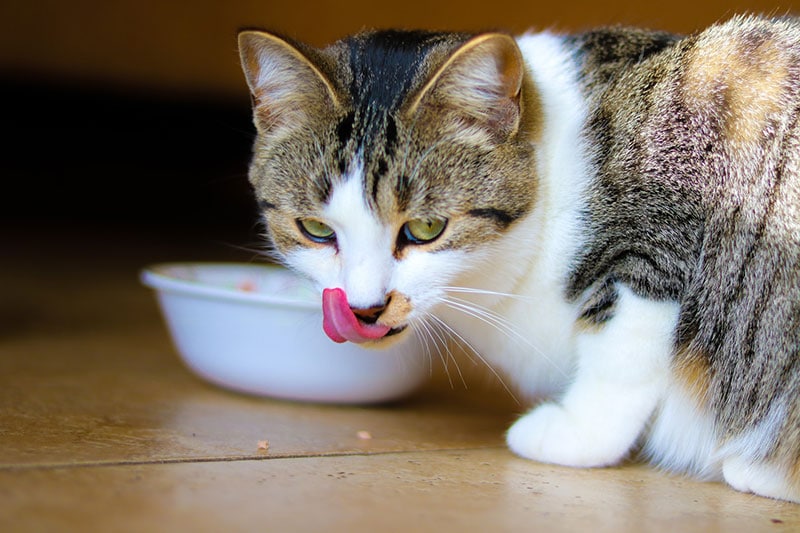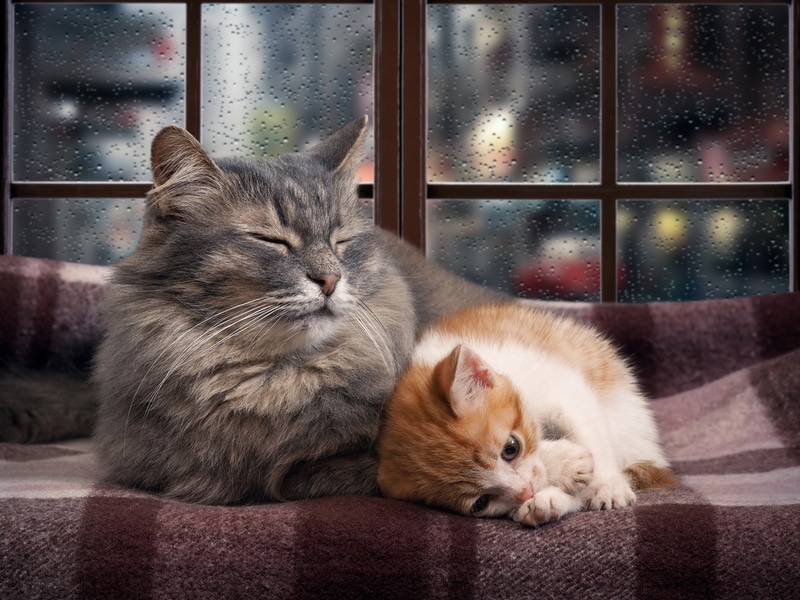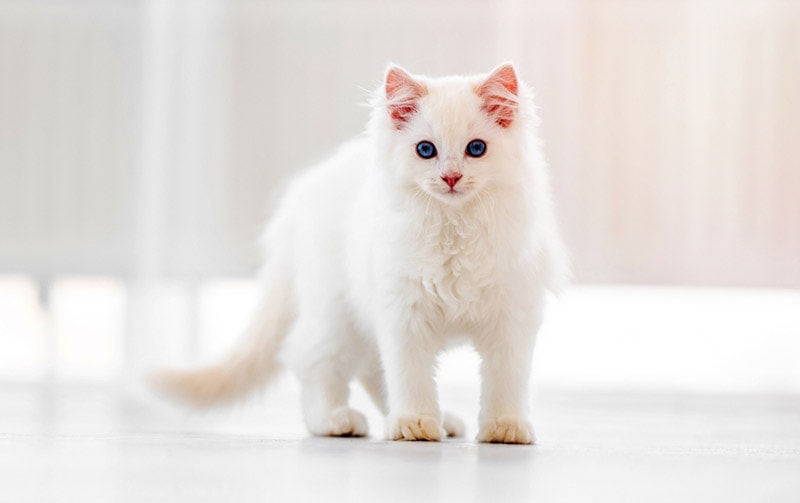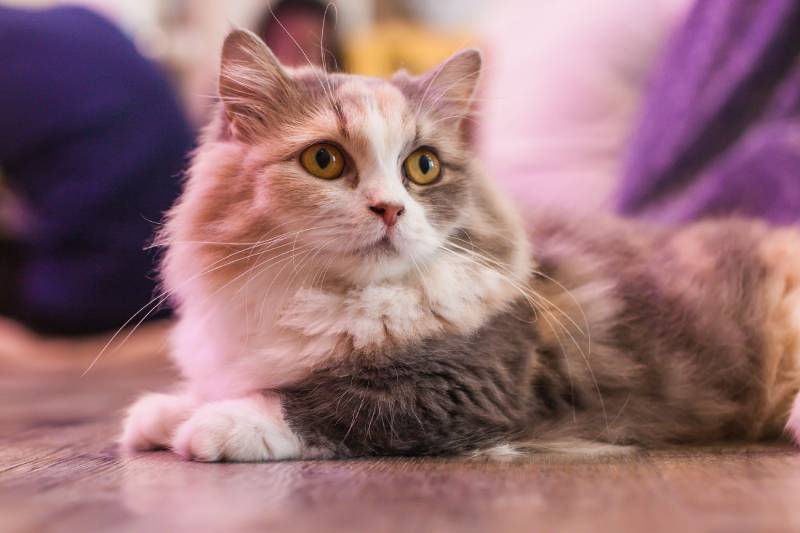Can Cats Eat Pickles? Vet-Reviewed Nutrition Facts & FAQ
Updated on

Pickles are not poisonous to cats. Therefore, your cat isn’t going to have a reaction if they sneak a bit of pickle off of your plate. However, just because they can eat pickles, that doesn’t necessarily mean they should.
The pickling process requires a large amount of salt. Therefore, pickles are high in salt. It’s unlikely that your cat will experience salt toxicity from eating a single pickle, as it would require a larger amount, but it’s something that’s just not appropriate for them. Also, pickles contain other ingredients that can actually be dangerous for cats. Some pickles are just pickled cucumbers, but others contain flavorings like garlic, which is toxic to felines. Therefore, you should carefully read the ingredient list if your cat accidentally eats a pickle, and consult with a veterinarian if they contain any harmful or toxic ingredients.
When Is Sodium Dangerous?
One of the reasons cats should avoid eating pickles is the high sodium content. No animal should eat too much sodium or more than their daily requirement. However, although humans can eat more salt than cats relative to our body weight, we actually have a lower threshold for salt toxicity compared to cats.1 Still, a little bit of sodium for us is a large amount of sodium for cats.
If cats consume too much sodium at once, particularly without access to fresh water, it can be harmful. Sodium is an electrolyte that controls how the body moves water between the cells and intercellular space. You must have sodium to survive or your body will be unable to transport water.
However, too much sodium can be a problem. It is difficult for cats to consume enough sodium through pickles for this to occur, but it could theoretically happen if they would eat excessive amounts of pickles, including pickle juice.
Too much salt will cause an increase in thirst, vomiting, diarrhea, lethargy, reduced appetite, and may even progress to development of neurological signs, such as loss of coordination, shaking, tremors, seizures, and coma. For this to happen, cats would need to eat a lot of salt, and this is unlikely to occur when it comes to pickles.
The toxic dose of salt for cats and dogs is around 2 to 3 grams/kilogram of bodyweight, which for cats weighing 1 to 10 pounds (0.45 to 4.6 kilograms) is more than 0.05 tablespoons, while for cats between 11 and 25 pounds (5 to 11.4 kilograms), is more than 0.5 tablespoons. According to the USDA, one small pickle may have around 450 milligrams of sodium. A cat weighing around 9 pounds would need to eat more than 15 pickles to experience adverse effects of salt.

Other Ingredients
Most pickles are not made with only cucumbers and a pickling solution. Instead, many include other ingredients as flavoring, such as garlic, which is toxic to cats. Garlic is one of the more toxic foods that a cat can eat, alongside other plants of the Allium family.
Ingestion of more than 0.5% of the animal’s body weight may lead to toxicity, with the American College of Veterinary Pharmacists stating that for smaller cats, more than 0.75 ounces can be toxic, while for larger cats, this is more than 0.85 ounces. As garlic is considered three to five times more toxic than onions, these amounts may be even less.
Your cat is unlikely to eat enough pickles for this much garlic to be consumed. However, it’s better to be safe than sorry. Also, even tiny pieces of garlic can cause other issues. Small cats will be affected faster than large cats, but kittens are at the highest risk because they may not even weigh 5 pounds.
Garlic poisoning signs may include vomiting, diarrhea, or the development of hemolytic anemia, which leads to fatigue, difficulty breathing, increased respiratory rate, increased heart rate, and pale gums.
Seek veterinary attention if your cat has ingested garlic in any form. Treatment for garlic poisoning varies depending on how much garlic was consumed and how much time has passed since it was eaten.
For cats that have just eaten the garlic, the vet may try to induce vomiting to remove the garlic from the cat’s digestive system if the ingested amount is significant enough to cause toxicity.
Beyond that, supportive therapy, such as IV fluids and oxygen therapy, can be given for more severe cases. There is no actual cure for garlic poisoning. Instead, the treatment focuses on preventing the garlic from being absorbed from the digestive tract and minimizing its harmful effects on the body while monitoring the red blood cells.

Are Cucumbers Toxic to Cats?
Cucumbers themselves are not toxic to cats. A cat could eat cucumber and be perfectly fine. They are not pickled in sodium, so you don’t have to worry about the high salt content. Similarly, cucumbers usually aren’t flavored with garlic.
However, cucumbers still aren’t great additions to a cat’s diet. Cats are obligate carnivores, so they should mostly eat meat. They evolved to live off prey they caught, which would not include cucumbers.
Some veggies and fruits can be fine for cats in small amounts as an occasional treat. Cucumbers have a high water content, and although they contain certain vitamins and minerals, due to the small amount of cucumbers that are appropriate to be offered to cats now and then, they are unlikely to give your cat any significant health benefits. If offered in excess, this may lead to a stomach upset. Speak to your vet if you want to offer your cat a slice of cucumber, and always remove the seeds and the peel first.
What Should I Do if My Cat Eats Pickles?
If you notice that your feline has eaten a pickle, you may not have to rush them to the vet. First, check the ingredient list on the pickle jar. If they do not include any dangerous ingredients, your cat will likely be fine. You should keep an eye on them, of course, but a few bites of a regular pickle shouldn’t cause any problems.
But if the pickle is seasoned with garlic, you should contact your vet immediately. They may want you to bring your cat in or recommend watching your cat.
Now that you know what you can safely feed your cat, it’s just as important to find a bowl that supports their health and well-being. With whisker-friendly bowls and a wide tray to catch any spills, our Hepper NomNom Cat Bowl is our favorite option.
Final Thoughts
Pickles aren’t the ideal treats for your cat. While they aren’t toxic in most cases, they can still cause underlying issues if fed to your cat regularly or in large amounts. Pickles are high in sodium and may contain garlic, which is toxic to cats. Although you can serve other vegetables packed with more nutrients than cucumbers or pickles, high-quality animal protein-based cat food is all your cat needs for a healthy diet.
Featured Image Credit: PhotoMIX-Company, Pixabay














